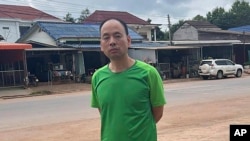China has been intensifying pressure on some prominent dissidents in recent weeks, as local prosecutors decide whether to impose jail sentences on human rights lawyer Lu Siwei, and police repeatedly threaten to arrest citizen journalist Zhang Zhan again.
Some human rights advocates say the renewed threats against Lu and Zhang are part of a broader campaign by the government to intensify crackdowns on activists and human rights lawyers.
“Beijing is trying to warn dissidents that if they try to defend the rule of law or freedom of expression, they could be arrested or imprisoned,” Bob Fu, founder of the Texas-based human rights organization ChinaAid, told VOA by phone.
Lu’s wife, Zhang Chunxiao, who now lives in the U.S., tells VOA that Chinese police in the southwestern province of Sichuan have imposed strict restrictions on her husband since he was released on bail in October, putting him under 24-hour surveillance and barring him from leaving the city of Chengdu without approval.
“The authorities have deployed eight to nine people to monitor him around the clock and he is followed by someone whether he is taking the metro or getting into a taxi,” she told VOA by phone.
Lu, a prominent human rights lawyer who has handled several high-profile cases, tried to flee China last year in July and reunite with his family in the United States by traveling through Southeast Asia last. Despite holding a valid U.S. visa and Chinese passport, he was arrested and detained by Laotian police and later deported back to China.
Zhang said the constant surveillance has made Lu feel isolated and experience serious mood swings.
“Almost everyone around him, including his friends and family members, has cut off contact with him so he is in a very bad mental state,” Zhang added.
In addition to surveillance and restrictions on his movement, the police told Lu last month that Chengdu prosecutors were reviewing his case and would determine whether to charge him with a crime or not later.
While Zhang said she hopes there is a slim chance authorities would decide not to charge her husband with any crime and let him regain his basic rights and freedom, some analysts say there is a high probability that Lu could be found guilty and given a jail sentence.
“Since the conviction rate in China is more than 99%, I think Lu will likely be prosecuted for some crime,” Yaqiu Wang, research director for China, Hong Kong, and Taiwan at Freedom House, told VOA by phone.
Fu in Texas said Lu’s experience is a typical case of China’s transnational repression, and that Beijing is preparing to prosecute him.
“His case shows that under Chinese President Xi Jinping’s rule, even a peaceful human rights lawyer would be arrested in a foreign country for trying to reunite with his family in the United States,” he told VOA.
In a written response, the Chinese Embassy in Washington said Beijing strictly abides by international law and fully respects the law enforcement sovereignty of other countries.
“There is no transnational repression,” Liu Pengyu, the embassy’s spokesperson, told VOA.
Forced family separation
While Lu faces the looming threat of prosecution in China, his family has also been forcibly separated since his wife and children moved to the U.S. in January 2022. Zhang said Lu’s detention and deportation back to China have pushed her to learn how to advocate for him, which is something that she wasn’t used to.
“I used to be a very quiet person living a simple life, but since his arrest last year, I had no choice but to start advocating for him,” she told VOA, adding that she has been doing it out of her instinct as a wife despite the work being difficult for her.
“My child is still young and my husband also needs my emotional support so I need to become stronger,” Zhang said.
Fu from ChinaAid said Zhang’s experience reflects a common situation that the family of other Chinese dissidents have to face.
“The pain that such forced separation brings to Chinese dissidents’ families is indescribable and it is a tragedy created by the Chinese government,” he told VOA.
Life-long threats from the Chinese government
While Lu awaits his fate, Chinese citizen journalist Zhang Zhan has been receiving repeated threats of rearrest by the police since she was released from prison in May.
Zhang, who was sentenced to four years for covering the initial lockdown in Wuhan during the COVID-19 pandemic, shared in a post on the messaging app WeChat on June 9 that police in Shanghai warned her that if she again crosses certain “red lines,” she would be jailed again.
In another video she uploaded onto YouTube in July, Zhang said authorities had confiscated her passport, and that she remains aware of possibly being followed.
Despite the recurring threats she faces, Zhang continues to advocate for the release of other Chinese dissidents who have been taken away by police in recent weeks.
Wang at Freedom House said that as Zhang continues to advocate for freedom and the rule of law, she will likely keep facing harassment and intimidation from the police.
“Surveillance and threats of reimprisonment will always accompany her, likely for the rest of her life,” she told VOA. “These cases show that the cost of dissenting is not limited to the formal time these dissidents serve in prison.”
Wang adds that it also shows how threats to dissidents under Xi Jinping are increasing and are often “all-encompassing.”






